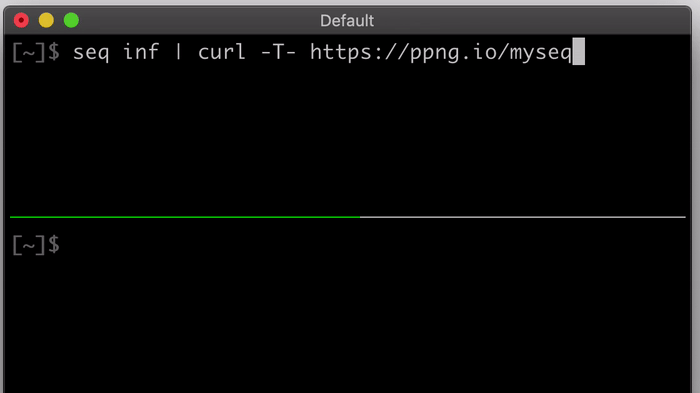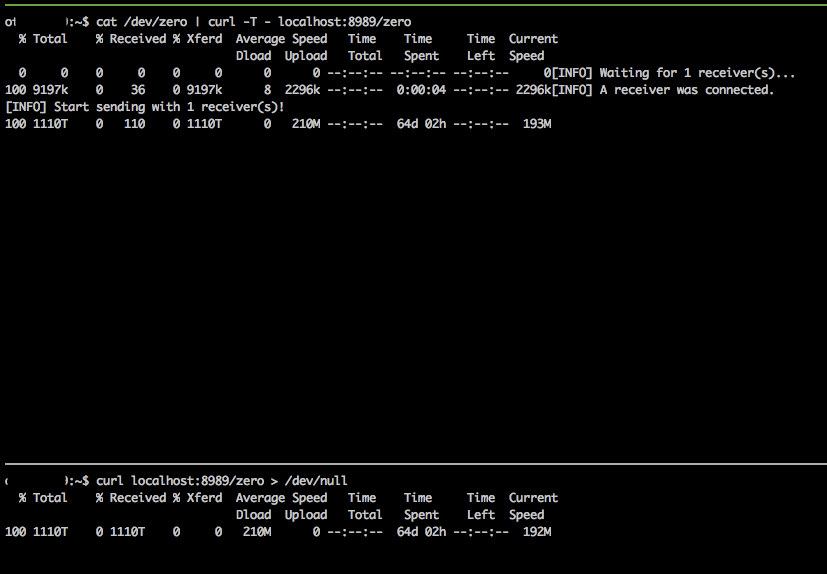Piping Server
Infinitely transfer between every device over HTTP/HTTPS
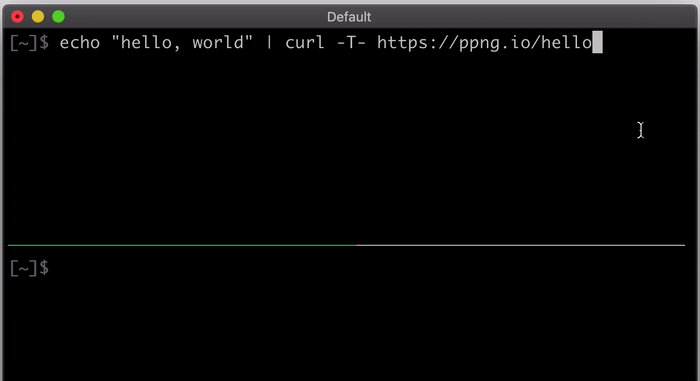
Transfer
Piping Server is simple. You can transfer as follows.
# Send
echo 'hello, world' | curl -T - https://ppng.io/hello# Get
curl https://ppng.io/hello > hello.txtPiping Server transfers data to POST /hello or PUT /hello into GET /hello. The path /hello can be anything such as /mypath or /mypath/123/. A sender and receivers who specify the same path can transfer. Both the sender and the recipient can start the transfer first. The first one waits for the other.
You can also use Web UI like https://ppng.io on your browser. A more modern UI is found in https://piping-ui.org, which supports E2E encryption.
Stream
The most important thing is that the data are streamed. This means that you can transfer any data infinitely. The demo below transfers an infinite text stream with seq inf.
Ideas
Piping Server is designed based on the ideas as follows.
- Infinite transfer: You can transfer any kind of data infinitely on a stream. Streams are very efficient in terms of both time and space.
-
Zero installation: All you need is to have either a Web browser or
curl, which are widely pre-installed. You do not need to install any extra software. - Simpleness: Making simple makes it more secure.
- Storageless: The server makes transfer more secure since the server never stores your data.
- Purity: The server streams over pure HTTP, which makes integration easier with other softwares.
- Engineer friendly: Also designed for Unix/Linux users, who use pipes, not only for Web browser users.
Applications
Any data such as text streams, video streams and protocols can be streamed over Piping Server. Here are applications that fully use the power of pure HTTP.
See: "The Power of Pure HTTP – screen share, real-time messaging, SSH and VNC"
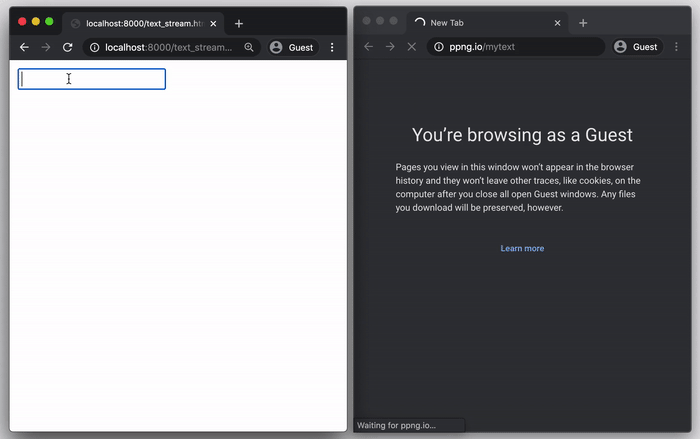 |
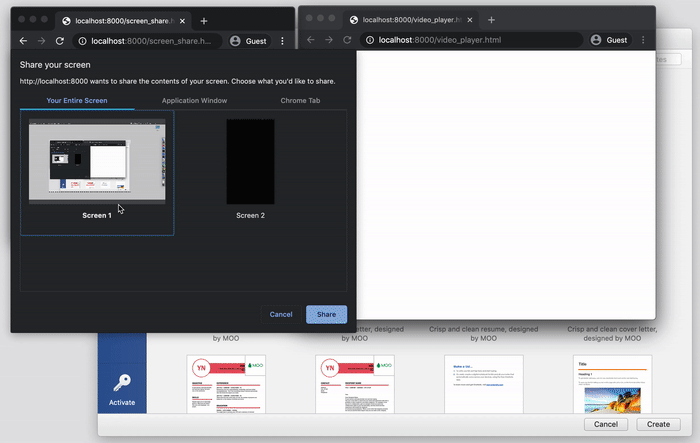 |
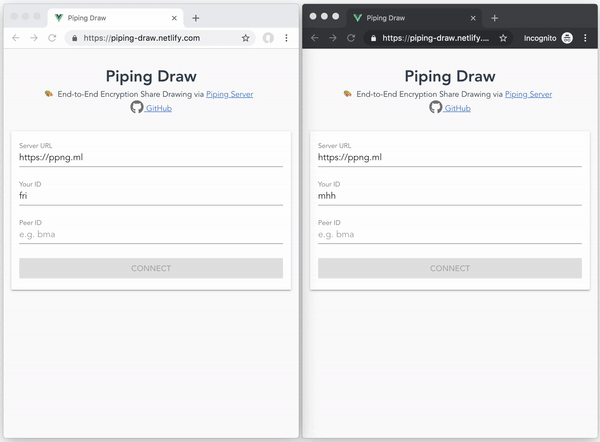 |
| Text stream chat | Screen share | Drawing share |
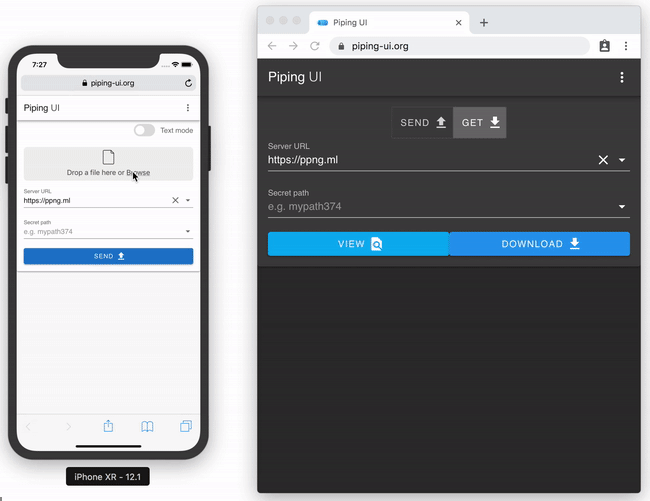 |
 |
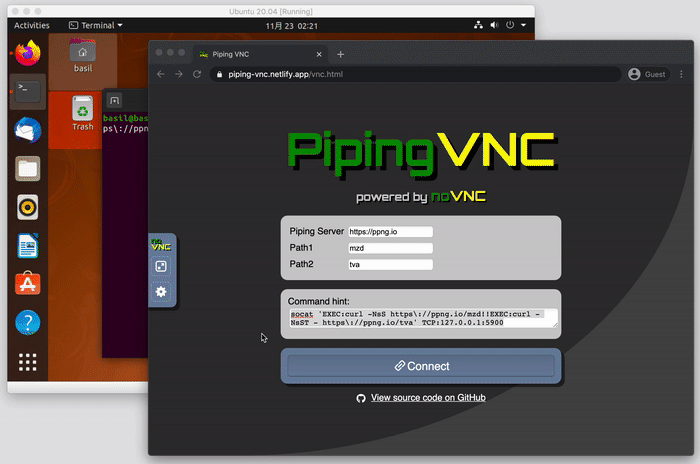 |
| E2E encryption file transfer | SSH on Web browser | VNC on Web browser |
The most important thing is that Piping Server stays simple. The applications use Piping Server as a core of data communication. It transfers data to POST /thepath into GET /thepath streamingly. The stream makes real-time communications over every device possible.
See "Ecosystem around Piping Server · nwtgck/piping-server Wiki" to find more about softwares using Piping Server.
Power of HTTP
In my experiment, Piping Server transferred 1,110TB (≈ 1PB) in a single HTTP request for 64 days and 2 hours at least. This means that it can transfer huge data and keep a request for about 2 months.
Engineer-friendly help
Get help and version only with curl.
curl https://ppng.io/helpcurl https://ppng.io/versionTransfer to multiple receivers
You can transfer to multiple receivers. In the demo below, query parameter ?n=3 is specified to allow three receivers.
Public servers
Here are public Piping Servers.
- https://ppng.io
- https://piping.nwtgck.repl.co
- https://piping.glitch.me
- https://piping-47q675ro2guv.runkit.sh
Self-host on Docker
Run a Piping Server on http://localhost:8080 as follows.
docker run -p 8080:8080 nwtgck/piping-serverRun a server in background and it automatically always restarts.
docker run -p 8080:8080 -d --restart=always nwtgck/piping-serverSelf-host using portable binaries
Run a Piping Server on http://localhost:8080 as follows on Linux.
curl -L https://github.com/nwtgck/piping-server-pkg/releases/download/v1.12.0/piping-server-pkg-linuxstatic-x64.tar.gz | tar xzvf -
./piping-server-pkg-linuxstatic-x64/piping-server --http-port=8080The binaries are for multi-platform including Linux on x64, Linux on ARM64, Linux on ARMv7, Intel macOS, Apple Silicon macOS and Windows on x64. See https://github.com/nwtgck/piping-server-pkg to run on the other platform.
Self-host on free services
Here are easier ways to own your Piping Server.
- Remix on Glitch https://glitch.com/~piping
- Clone on RunKit: https://runkit.com/nwtgck/piping
- Fork on Repl.it: https://repl.it/@nwtgck/piping
See "Ecosystem around Piping Server · nwtgck/piping-server Wiki" to find more about self-hosting.
Headers passed from sender to receivers
Here are headers passed to receivers.
Content-TypeContent-LengthContent-Disposition-
X-Piping: custom header whose value is freely specified by the sender
Server options
Here is available CLI options by piping-server --help.
Options:
--help Show help [boolean]
--version Show version number [boolean]
--host Bind address (e.g. 127.0.0.1, ::1) [string]
--http-port Port of HTTP server [default: 8080]
--enable-https Enable HTTPS [boolean] [default: false]
--https-port Port of HTTPS server [number]
--key-path Private key path [string]
--crt-path Certification path [string]
Piping Server written in Rust
Piping Server is also developed in Rust.
https://github.com/nwtgck/piping-server-rust




